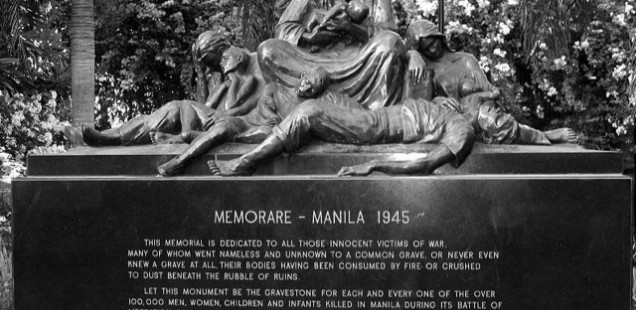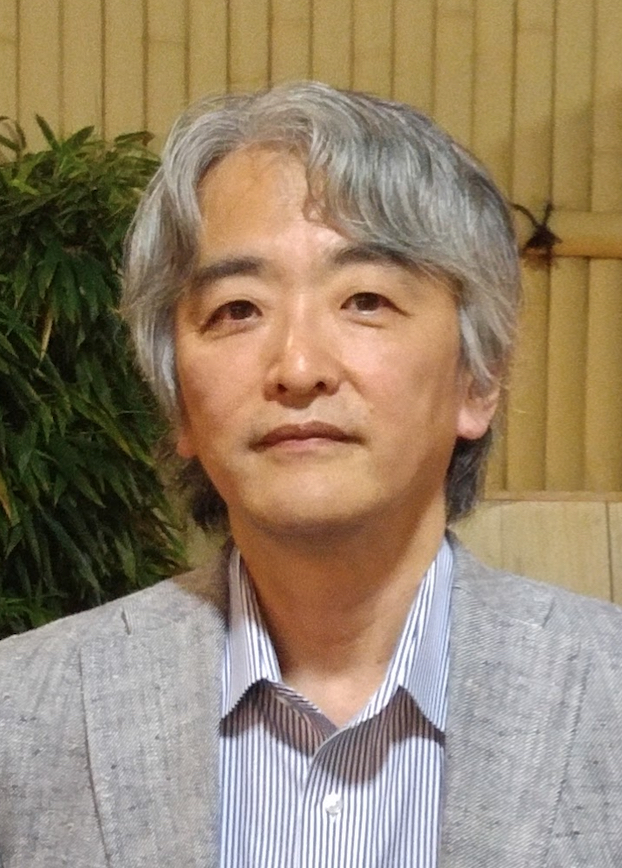
Memorare Manila 1945 Anniversary – 16 Feb. 2019 –
On the morning of 16 February 2019, people gathered in front of the Memorare Manila 1945 monument to hold the year’s Memorare Manila 1945 Anniversary ceremony commemorating the innocent victims, non-combatant men, women, children and infants killed in Manila during its Battle of Liberation February 3 to March 3, 1945. I read the message as a member of Bridge for Peace from Japan.
@KOJI DE BENGUET
The following is the message I read.
President Jose Miguesl Cabarrus, Memorare-Manila 1945 Foundation, and all the distinguished participants and guests coming here this morning in front of the Memorare Manila 1945 monument, it is my great honor to speak in front of you, as a member of Bridge for Peace from Japan, at this anniversary memorial commemorating the innocent victims, non-combatant men, women, children and infants killed in Manila during its Battle of Liberation February 3 to March 3, 1945.
Allow me to tell a rather personal story, since I think it is a good way for us to share the significant achievements brought about by Memorare’s fight for remembrance since the dedication of this memorial statue in February 1995. 24 years ago, I was here as a visiting scholar from Japan and had an opportunity to attend the dedication of this statue and the requiem mass held at the Manila Cathedral. There the Prayers of the Faithful, one of which apparently addressed to the Japanese perpetrators, was read by Mr. Fernando Vasquez-Prada, who was five years old at the time of the De La Salle College Massacre and the sole survivor of his family of six:
For those who killed and
Memorare Manila 1945, “Requiem Mass (program leaflet with lyrics),” 18 February 1995.
Raped and slaughtered that
they may acknowledge
their guilt and seek forgiveness
let us pray to the Lord
Since then I’ve never forgotten and will never ever forget the requiem mass on that day. The Philippines’ media coverage of those commemorative events was large enough to mark the beginning of restoring the battle’s place in the collective memory, while there was no coverage on these events in Japan, nor would be any, for many years to come. This was the starting point of the battle against forgetting.
Since then, Memorare-Manila’s tenacious effort for remembrance, or protest against forgetting, has been bearing fruit to a significant extent in mobilizing the media and scholars not only within but also outside of the Philippines to devote more attention to the battle and its historical significance. My heartfelt congratulations to Mr. James M. Scott and the publication of Rampage, which certainly is one of the most important contributions to the battle against forgetting.
It should also be remembered that, in 2006, on the sixty-first anniversary commemoration, Japanese Ambassador Ryuichiro Yamazaki attended the gathering for the very first (and only) time as the Japanese Ambassador. He took the opportunity to make the following statement:
With this historical fact in mind, I would like to express my heartfelt apologies and deep sense of remorse over the tragic fate of Manila. Let me also reiterate the Japanese Government’s determination not to allow the lessons of that horrible World War II to erode, and to contribute to the peace and prosperity of the world without ever waging a war.
Remarks by H.E. Ambassador Ryuichiro Yamazaki on the occasion of the 61st Anniversary of the Battle for the Liberation of Manila Plazuela de Santa Isabel, Intramuros, Manila, 18 February 2006.
I think that the question whether this statement was official or personal should primarily be judged by you (the audience). What is certain, to my regret, is that the ambassador’s significant statement was not given any considerable coverage in Japanese media at that time. This chronic lack of publicity has long limited the Japanese public’s awareness on what happened in the Philippines during the war to this date.
On the other hand, there have been some hopeful signs of regaining awareness. In August 2007, the first-ever major TV documentary on the battle was produced and aired by NHK (Japan Broadcasting Corporation). Further coverage by NHK and other media on the topic followed, which might moderately contribute to the increasing awareness of the Japanese public on the battle, if not enough.
Another noteworthy development was, of course, that Memorare-Manila found its Japanese counterpart in Bridge for Peace, a small, non-profit peace advocacy group of Japanese led predominantly by the young individuals in their twenties and thirties. The group was organized in August 2004 by Naoko Jin, then a twenty-six years old Japanese woman, who launched the project collecting video messages of the ex-Japanese soldiers, including many who admitted their guilt and sought forgiveness, and bringing and showing them to the Filipino war survivors and the victims’ family. The group, though small, has attracted considerable attention from Japanese media mainly because of uniquely nonpartisan and youthful character of the group and its activities. Then BFP received an invitation from Memorare-Manila to attend its annual commemoration ceremony on 19 February 2011 and has been invited to every annual commemoration gathering since then.
A further unexpected development followed in January 2016 on Japanese Emperor and Empress state visit to the Philippines. Upon his departure for the Philippines from the Haneda International Airport, the Emperor made a televised address to Japanese people, officially referred to as “His Majesty’s Words” (okotoba), in front of the Prime Minister and others:
During World War II, countless Filipino, American, and Japanese lives were lost in the Philippines. A great many innocent Filipino civilians became casualties of the fierce battles fought in the city of Manila. This history will always be in our hearts as we make this visit to the Philippines.
Remarks by His Majesty the Emperor at the Time of Their Majesties’ Departure for the Republic of the Philippines (January 26, 2016) [http://www.kunaicho.go.jp/page/okotoba/showEn/3#6]
The Emperor’s mention of the Battle of Manila was entirely unexpected since it was unprecedented for the Emperor to refer to any particular events of war in this way in any of “His Majesty’s Words.” The Battle of Manila was, in a sense, suddenly but definitively brought out from the decades of amnesia into the absolute recognition in Japan’s official memory. [Note: it should be noted, however, that the Emperor is not expected to make any “political” statements in Japan’s postwar constitutional norms, thus making it unnecessary and impossible for the government to confirm any political implications of “His Majesty’s Words.”]
Did this imperial statement finally and eventually restored Japanese public memory on the battle of Manila and the Philippines? Not enough, I should say. Overcoming amnesia in Japan has been, and should be, the most important part of protest against forgetting on the Battle of Manila tragedies. Success so far has been made possible because of the Memorare’s unique way of fighting against forgetting by quiet persuasion, or civility if I may say. I as well as my colleagues from Japan here cannot be more proud to be a part of this fight. Thank you very much.
16 February 2019


Recent Comments